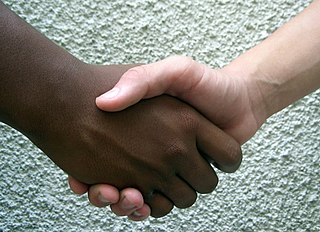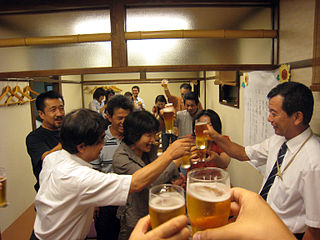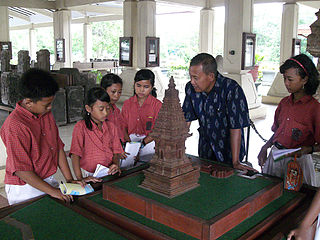(Social conduct in Ghana)
In general, Ghanaians emphasize communal values such as family, the importance of dignity, and proper social conduct. [1]
In general, Ghanaians emphasize communal values such as family, the importance of dignity, and proper social conduct. [1]
Ghanaians' individual conduct is seen as impacting their entire family, social group, and community; therefore everyone is expected to be respectful, dignified, and observant in public settings and most aspects of life. [1]
When greeting people in a home, it is considered improper if the guest ignores anyone present. Guests are expected to acknowledge and greet every person at a social occasion, including children and babies.
When shaking hands, it is appropriate for the guest to first greet the person on their right-hand side, and then work their way left. This ensures that the guest's palm makes contact with the palm of the person receiving the handshake – touching the back of the hand instead of the palm is considered insulting or unlucky. Guests are expected to greet the most elderly person present first. [1]
The same ritual is expected to be observed upon departure and should be carried out until sufficient familiarity has been established, at which point the ritual becomes redundant. [1]
When greeting dignitaries, this procedure is expected to be carried out by all persons present regardless of age or status. [1]
Asking a person to a social event (e.g. a bar or a restaurant) implies that the person offering the invitation will pay for everything. Inviting people out and then expecting them to pay for themselves is considered extremely rude. When a foreigner is invited to visit a home or community, the guest is expected to bring a gift, commonly a bottle of Schnapps or Kasapreko gin which is available in any shop.
Naming ceremonies and marriages are marked by family ceremonies. Seasonal festivals serve to bring people together in a spectacular fashion. [1]
When attending funerals, weddings, or naming ceremonies; women, including foreign women, must cover their heads with a hat or simple black cloth wound around the head. A man must not have his head covered. [1]
It is unacceptable for women, particularly young foreign women, to wear revealing clothing. Women's clothing that would be acceptable in the West (shorts, low-cut strapped tops, etc.) is not socially acceptable in Ghanaian society. Similarly it is unacceptable for foreign men to be shirtless in public, and unacceptable for Ghanaian men to a lesser degree. Ghanaian social norms are sometimes difficult to establish as younger adults are generally much less inhibited about wearing revealing clothing or being shirtless. In contrast, older Ghanaian citizens may find such apparel to be insulting. A general rule is to dress conservatively unless in the company of people of one's own gender or age with whom one is well-acquainted. [1]
Drinking alcohol and smoking in public are serious faux pas and should be avoided. Public intoxication to any degree is generally viewed with extreme disapproval. Such activities are perfectly acceptable in a local bar though. When drinking alcohol, it is a common custom to pour the last few drops on the ground as a libation for the gods. People who decline from drinking alcohol may accept an alcoholic drink with gratitude, raise it to their lips without drinking, and then pour it on the ground. Raising the glass to the lips signifies gratitude and pouring the drink away is thus a socially acceptable alternative for those who do not drink. This custom permits non-drinking Ghanaians to join social events without offending those present by refusing a drink. [1]
Taking photographs of people unknown to the photographer must be conducted with the same level of consideration as in one's own country. Most Ghanaians are happy to pose for pictures, as it is considered polite. [1]

A wedding reception is a party usually held after the completion of a marriage ceremony as hospitality for those who have attended the wedding, hence the name reception: the couple receive society, in the form of family and friends, for the first time as a married couple. Hosts provide their choice of food and drink, although a wedding cake is popular.

A handshake is a globally widespread, brief greeting or parting tradition in which two people grasp one of each other's hands and in most cases accompanied by a brief up-and-down movement of the grasped hands. Customs surrounding handshakes are specific to cultures. Different cultures may be more or less likely to shake hands, or there may be different customs about how or when to shake hands.

Respect, also called esteem, is a positive feeling or deferential action shown towards someone or something considered important or held in high esteem or regard. It conveys a sense of admiration for good or valuable qualities. It is also the process of honoring someone by exhibiting care, concern, or consideration for their needs or feelings.

Greeting is an act of communication in which human beings intentionally make their presence known to each other, to show attention to, and to suggest a type of relationship or social status between individuals or groups of people coming in contact with each other. Greetings are sometimes used just prior to a conversation or to greet in passing, such as on a sidewalk or trail. While greeting customs are highly culture- and situation-specific and may change within a culture depending on social status and relationship, they exist in all known human cultures. Greetings can be expressed both audibly and physically, and often involve a combination of the two. This topic excludes military and ceremonial salutes but includes rituals other than gestures. A greeting, or salutation, can also be expressed in written communications, such as letters and emails.
Bowing is the act of lowering the torso and head as a social gesture in direction to another person or symbol. It is most prominent in Asian cultures but it is also typical of nobility and aristocracy in many European countries. It is also used in religious contexts, as a form of worship or veneration. Sometimes the gesture may be limited to lowering the head such as in Indonesia, and in many cultures several degrees of the lowness of the bow are distinguished and regarded as appropriate for different circumstances. It is especially prominent in Nepal, Cambodia, Thailand, Laos, Vietnam, China, Korea, and Japan, where it may be executed standing or kneeling. Some bows are performed equally by two or more people while others are unequal – the person bowed to either does not bow in return or performs a less low bow in response. A nod of the head may be regarded as the minimal form of bow; forms of kneeling, genuflection, or prostration which involves the hands or whole body touching the ground, are the next levels of gesture.

Etiquette in Japan forms common societal expectations of social behavior practiced throughout the nation of Japan. The etiquette of Japan has changed greatly over the millennia as different civilizations influenced its culture. Modern Japanese etiquette has a strong influence from that of China and the Western world, but retains many of its unique traditional elements.

A nomikai is a type of drinking party popular in Japanese culture. Nomikai are a part of the culture of most places of employment, from schools to nightclubs. They are most often held in restaurants or izakaya, usually with everyone seated at one large table or occupying a separated section of the venue.

Table manners are the rules of etiquette used while eating, which may also include the use of utensils. Different cultures observe different rules for table manners. Each family or group sets its own standards for how strictly these rules are to be followed.

Rudeness is a display of actual or perceived disrespect by not complying with the social norms or etiquette expected within a relationship, social group, or culture. Social norms are established as the essential guidelines of normally accepted behavior within a given context, and individuals often establish personal boundaries to meet their own needs and desires within smaller settings, such as friendships. To be unwilling to align one's behavior with these norms known to the general population of what is socially acceptable is to be rude. These norms may resemble a sort of "unspoken law", with social repercussions or rewards for violators or advocates, respectively.

Russian traditions and superstitions include superstitions and folk rituals of the Russian community. Many of these traditions are staples of everyday life, and some are even considered common social etiquette despite being rooted in superstition. The influence of these traditions and superstitions vary, and their perceived importance depends on factors such as region and age.

Etiquette in Asia varies from country to country even though certain actions may seem to be common. No article on the rules of etiquette, nor any list of faux pas, can ever be complete. As the perception of behaviors and actions vary, intercultural competence is essential. A lack of knowledge about the customs and expectations of Asian people can make even those with good intentions seem rude, foolish, and disrespectful.
Expectations regarding good manners differ from person to person and vary according to each situation. As the perception of behaviors and actions vary, intercultural competence is essential. However, a lack of knowledge about the customs and expectations of people in Australia and New Zealand can make even the best intentioned person seem ignorant, inconsiderate or even rude. Given the historic roots, it's very similar to British culture, specifically the United Kingdom, terms such as ‘fanny’ as well as the emphasis on politeness in queuing are observed in both cultures.
Etiquette rules in the United States and Canada generally apply to all individuals, unlike cultures with more formal class structures, such as those with nobility and royalty.

Akpeteshie is a liquor produced by distilling palm wine or sugar cane, primarily in the region of Western Africa. It is the national spirit of Ghana. In Nigeria it is known as Ògógóró (Ogog'), a Yoruba word, usually distilled locally from fermented Raffia palm tree juice, where it is known as the country's homebrew. Today, there is a misconception that Ogogoro can be pure ethanol, but traditionally, it had to come from the palm tree and then be distilled from this source.

Traditions of Indonesia are traditions, beliefs, values, and customs that belong within the culture of Indonesian people. Indonesia is a vast country of sprawling archipelago with a diverse demographic range of over 1,300 ethnic groups, and speaking more than 700 living languages.

Various codes of etiquette in Indonesia govern the expectations of social behavior in the country and are considered very important. Etiquette demonstrates respect and is a key factor in social interactions. Like many social cultures, etiquette varies greatly depending on one's status relative to the person in question. Some conventions may be region-specific, and thus may not exist in all regions of Indonesia. The following are generally accepted contemporary customs in Indonesia.

In South Korea, etiquette, or the code of social behavior that governs human interactions, is largely derived from Korean Confucianism and focuses on the core values of this religion. In addition to general behaviour, etiquette in South Korea also determines how to behave with responsibility and social status. Although most aspects of etiquette are accepted by the country at large, customs can be localized to specific regions or influenced by other cultures, namely China, Japan, and the United States.

Korea's drinking culture interfaces deeply with its social structure, lifestyle, and traditions. Koreans drink so much because they work so hard The beverages themselves are also reflective of the country's varying geography, climate, and culture.

Japanese dining etiquette is a set of traditional perceptions governing specific expectations which outlines general standards of how one should behave and respond in various dining situations.

Bowing in Japan is the act of lowering one's head or the upper part of the torso, commonly used as a sign of salutation, reverence, apology or gratitude in social or religious situations.